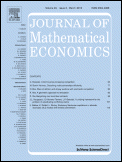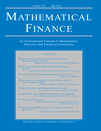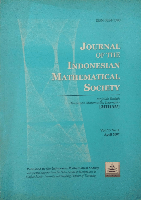
JOURNAL OF MATHEMATICAL ECONOMICS
Scope & Guideline
Unlocking Complex Economic Problems through Mathematical Methods.
Introduction
Aims and Scopes
- Mathematical Modeling of Economic Systems:
The journal emphasizes the development and analysis of mathematical models that represent economic phenomena, including general equilibrium models, game theory, and decision-making processes. - Interdisciplinary Approaches:
It integrates insights from various disciplines such as economics, mathematics, and behavioral sciences to enhance the understanding of complex economic interactions. - Analytical and Computational Techniques:
The use of rigorous analytical methods and computational simulations is a hallmark of the journal, facilitating the exploration of economic dynamics and equilibria. - Behavioral Economics and Decision Theory:
Papers often explore aspects of human behavior and decision-making processes within economic contexts, including risk, uncertainty, and preference modeling. - Equity and Fairness in Allocations:
The journal includes studies on equitable allocation mechanisms, social choice theory, and fairness in economic transactions, reflecting a commitment to addressing ethical considerations in economics.
Trending and Emerging
- Economic Epidemiology:
The journal has seen a surge in research addressing the intersection of economics and public health, particularly in response to the COVID-19 pandemic, highlighting the importance of economic modeling in understanding epidemic dynamics. - Behavioral Insights in Economic Decision-Making:
There is a growing trend towards incorporating behavioral economics concepts, including bounded rationality and heuristics, into traditional economic models to better understand decision-making processes. - Network Theory Applications in Economics:
Recent papers increasingly utilize network theory to model complex relationships and interactions among economic agents, providing new insights into market dynamics and social interactions. - Dynamic and Adaptive Mechanism Design:
The journal is focusing more on dynamic mechanisms that adapt to changing environments and player behaviors, moving beyond static designs to address real-world complexities. - Environmental Economics and Sustainability:
Research on the economic implications of environmental policies and sustainability practices is gaining traction, reflecting a broader societal concern for ecological issues and their economic ramifications.
Declining or Waning
- Traditional Microeconomic Theory:
There has been a noticeable decline in papers focusing solely on classical microeconomic theories without incorporating newer methodologies or interdisciplinary approaches. - Static Economic Models:
The journal's emphasis has shifted away from purely static models towards dynamic frameworks that account for temporal changes and uncertainties in economic behaviors. - Over-reliance on Classical Game Theory:
While game theory remains important, the journal is moving towards more innovative applications and adaptations of game-theoretic concepts rather than traditional formulations. - Narrow Focus on Specific Economic Policies:
Papers that strictly analyze isolated economic policies without broader implications or connections to general equilibrium frameworks are becoming less common. - Deterministic Models in Favor of Stochastic Approaches:
The preference for deterministic models is waning as the journal increasingly favors stochastic approaches that better capture the uncertainties inherent in economic systems.
Similar Journals

ANZIAM JOURNAL
Fostering Excellence in Mathematical DiscourseANZIAM JOURNAL, published by Cambridge University Press, serves as a pivotal platform for disseminating high-quality research in the field of mathematics. With an ISSN of 1446-1811 and an E-ISSN of 1446-8735, this journal caters to a diverse audience, including researchers, professionals, and students interested in the latest advances and applications in mathematics, particularly in the miscellaneous category. Having a Scopus rank of #42 out of 90 in its field and sitting at the 53rd percentile, the ANZIAM JOURNAL emphasizes rigorous peer-reviewed research while fostering innovative mathematical discussions. Since its inception in 2000, it has continuously evolved, maintaining a commitment to excellence and accessibility, with open access options available to reach a wider audience. The journal's geographic roots in Cambridge, England, further underscore its prestigious standing in the academic community. Researchers and practitioners alike will find indispensable insights and developments within its pages as it looks toward a vibrant future through 2024 and beyond.

American Economic Journal-Applied Economics
Shaping the Future of Economic Policy Through Rigorous AnalysisWelcome to the American Economic Journal - Applied Economics, a premier publication in the field of applied economics that strives to provide scholars and practitioners with cutting-edge research and insights. Published by the American Economic Association, this journal ranks in the top quartile (Q1) of Economics, Econometrics, and Finance categories as of 2023, reflecting its significant impact and relevance in the field. With a notable Scopus ranking of #5 out of 288 in General Economics and a distinguished percentile of 98th, this journal serves as a vital resource for advancing knowledge in economic theory and its application to real-world issues. Although not open access, it remains accessible to a broad audience, and welcomes submissions that explore innovative methodologies and empirical analyses that bridge theory and practice. Spanning from 2009 to 2024, the journal not only supports rigorous academic discourse but also plays a crucial role in shaping the discourse around effective economic policy. We invite researchers, professionals, and students in the field to engage with the high-quality work published within these pages.

MATHEMATICAL FINANCE
Empowering Researchers in the World of FinanceMATHEMATICAL FINANCE is a prestigious journal published by Wiley, focusing on the interdisciplinary fields of finance, applied mathematics, accounting, and economics. With its ISSN 0960-1627 and E-ISSN 1467-9965, this journal has earned its place in the top tier of academic publications, reflected by its Q1 rankings across multiple categories in 2023, including Accounting, Applied Mathematics, Economics and Econometrics, Finance, and Social Sciences. MATHEMATICAL FINANCE, which commenced publishing in 1991, is recognized for its rigorous peer-review process and its significant contribution to the advancement of knowledge in quantitative finance methodologies and risk management practices. Although it does not currently offer open access, the journal remains an invaluable resource for researchers, professionals, and students seeking to stay abreast of the latest theoretical advancements and empirical studies in mathematical finance. Its impact factor and Scopus rankings further illustrate its high standing within the academic community, making it an essential platform for impactful research and scholarly discourse.

SOCIAL CHOICE AND WELFARE
Empowering Research for a Fairer SocietySOCIAL CHOICE AND WELFARE is a prestigious academic journal published by Springer, dedicated to advancing the field of social choice theory and welfare economics. With its foundation dating back to 1984, the journal has made significant contributions to theoretical and applied research, becoming a leading platform for the dissemination of innovative ideas. It holds an impressive categorization in 2023, ranking in Q2 for Economics and Econometrics and Q1 for miscellaneous Social Sciences, reflecting its dual impact across these vital disciplines. The journal's Scopus ranking further highlights its influence, situated within the 57th percentile in Social Sciences (miscellaneous) and the 34th percentile in Economics, Econometrics, and Finance. Researchers, professionals, and students can access a wealth of knowledge without open access barriers, as it combines rigorous peer-reviewed articles with important theoretical developments. Its contribution to understanding societal preferences and resource allocation makes it an essential read for those engaged in economic and social research.

ECONOMETRICA
Inspiring the next generation of economic scholars.ECONOMETRICA, published by Wiley, is a leading journal in the field of economics and econometrics, renowned for its rigorous and cutting-edge research contributions. With an ISSN of 0012-9682 and an E-ISSN of 1468-0262, this esteemed journal holds a prestigious position in the academic landscape, classified in the top quartile (Q1) for both Economics and Econometrics as of 2023, and ranked 42 out of 716 in its field, placing it in the 94th percentile according to Scopus metrics. The journal's scope encompasses a diverse range of topics aimed at advancing economic theory and its practical applications, making it an essential resource for scholars, practitioners, and students alike. Although it operates under a subscription model, the depth and quality of research published in ECONOMETRICA underscore its significance as a cornerstone for intellectual discourse and innovation within the field. Based in the United Kingdom, at 111 River St, Hoboken, NJ 07030-5774, ECONOMETRICA continues to attract high-caliber contributions that shape the future of econometric research.

INTERNATIONAL JOURNAL OF GAME THEORY
Connecting Disciplines through Strategic AnalysisINTERNATIONAL JOURNAL OF GAME THEORY, published by Springer Heidelberg, is a distinguished journal dedicated to the rigorous exploration of game theory across multiple disciplines, encompassing economics, mathematics, social sciences, and statistics. Established in 1971, this journal has become a pivotal resource for scholars and practitioners seeking to deepen their understanding of strategic interactions and decision-making processes. With ISSN 0020-7276 and E-ISSN 1432-1270, the journal spans its focus on theoretical advancements and practical applications in game theory. The journal currently ranks in the Q2 and Q3 quartiles across various categories, reflecting its impact and relevance in the academic community. Although not an open-access journal, it continues to provide invaluable insights for researchers, professionals, and students aiming to advance their knowledge in this critical area of study. The journal's commitment to fostering intellectual discourse is evident through its comprehensive coverage of topics relevant to modern-day challenges, positioning itself as an essential platform in the academic landscape.

Dynamic Games and Applications
Fostering Collaboration in Applied Mathematics ResearchDynamic Games and Applications (ISSN: 2153-0785, E-ISSN: 2153-0793) is a premier journal published by SPRINGER BIRKHAUSER that specializes in the field of applied and computational mathematics. With a notable impact factor and a solid standing within the Q2 quartile in several categories including Applied Mathematics and Computational Theory, this journal serves as a vital platform for researchers and practitioners looking to explore dynamic games and their applications across diverse disciplines. Covering a wide range of subjects from computer graphics and economics to advanced statistical methods, Dynamic Games and Applications seeks to publish original research that deepens the understanding of strategies in competitive and cooperative environments. As a crucial resource for academics, industry professionals, and graduate students, the journal not only disseminates innovative findings but also fosters collaboration and interdisciplinary research in an increasingly complex mathematical landscape.

EXPERIMENTAL ECONOMICS
Catalyzing new ideas in the realm of experimental economics.EXPERIMENTAL ECONOMICS is a leading journal dedicated to the advancement of knowledge in the field of economic experimentation and behavioral finance. Published by SPRINGER, this esteemed journal plays a pivotal role in disseminating high-quality research that explores the intersection of economics and experimental methodology. With an impressive Q1 ranking in the category of Economics, Econometrics and Finance (miscellaneous) and a Scopus rank of #52 out of 242, it stands out as a premier outlet for innovative scholarship. Although it operates under a subscription model, the journal is committed to providing its readership with insights into rigorous experimental designs and their applications in economic theory and practice. Researchers and practitioners alike can benefit from its extensive array of studies, contributing to the ongoing dialogue and development within the economic landscape. Covering a scope that converges from 2003 to 2024, EXPERIMENTAL ECONOMICS is not just a repository of knowledge but a catalyst for new ideas, thereby inviting professionals, students, and scholars to engage with cutting-edge research that shapes the future of economics.

ECONOMIC INQUIRY
Fostering Academic Rigor in Economic Research.ECONOMIC INQUIRY, published by Wiley, is a prestigious academic journal that has been at the forefront of research in economics and management since its inception in 1962. With an ISSN of 0095-2583 and an E-ISSN of 1465-7295, this journal is renowned for its rigorous peer-reviewed articles, embracing a wide scope of economic and econometric inquiries. Its impressive placement in the Q1 category for both Business, Management and Accounting, and Economics and Econometrics highlights its significance within these fields. With a Scopus rank placing it in the top quartile of Economics and Econometrics journals, alongside a ranking for Business studies, it caters to a diverse audience of researchers, professionals, and students eager to deepen their understanding of economic phenomena. Although it operates under a traditional subscription model and does not offer open access, the journal's contributions are instrumental in advancing knowledge and discourse in economic theory and practice, making it an essential resource for anyone involved in this vibrant discipline.

Journal of the Indonesian Mathematical Society
Pioneering Discoveries in the Heart of Indonesia.Journal of the Indonesian Mathematical Society is an esteemed platform that serves as a vital conduit for the dissemination of research in various domains of mathematics. Published by the Indonesian Mathematical Society, this journal prioritizes fostering mathematical knowledge and innovation among scholars both regionally and globally. While it currently holds a Q4 ranking in the field of Mathematics (miscellaneous) and ranks within the lower percentile on Scopus, it actively encourages contributions from mathematicians that push the boundaries of current research trends. The journal, accessible at imsi.org/journal, emphasizes open access to ensure that findings reach a wider audience, thereby enhancing their impact. Located in Bandung, Indonesia, and set to converge its publication years from 2019 to 2024, it stands as an important venue for researchers, professionals, and students engaged in mathematical inquiry and advancement.